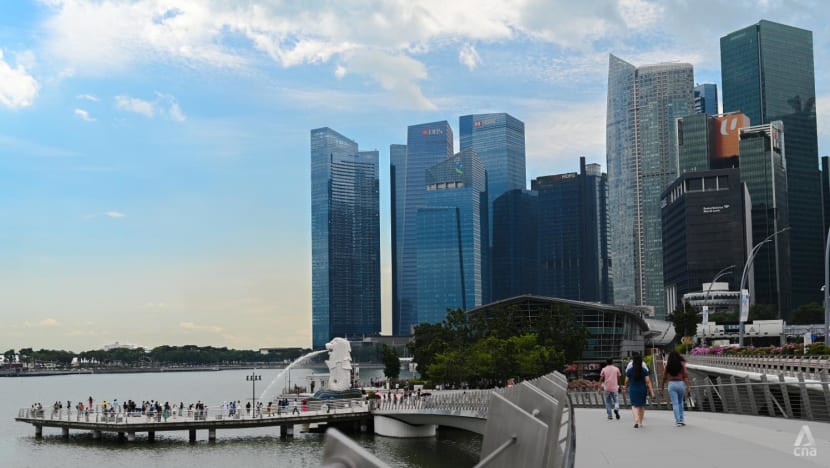Commentary: Will Singapore be able to avoid recession in 2023 as hoped?
Singapore escaped a technical recession in the second quarter of 2023. There are bright spots in the economy, says OCBC chief economist Selena Ling.

A view of Singapore's central business district and the Merlion on Nov 16, 2022. (File photo: CNA/Hanidah Amin)
SINGAPORE: Avoiding a recession and achieving positive economic growth this year are two hopes that Prime Minister Lee Hsien Loong has for the Singapore economy. He shared these hopes in his National Day Rally speech on Sunday (Aug 20).
Some might think that amid the many challenges - geopolitical tensions, a chaotic global economic order and stubborn inflation - that these hopes may be a pipe dream. But I think they are still achievable.
At first glance, the outlook for Singapore’s latest economic performance looks bleaker than half a year ago when anticipation of China’s reopening ran high. Earlier this month, the Ministry of Trade and Industry (MTI) narrowed Singapore's 2023 GDP growth forecast to 0.5 to 1.5 per cent, from 0.5 to 2.5 per cent, after second-quarter growth came in lower than expected.
Manufacturing was the main drag, contracting 7.3 per cent year-on-year on the back of a protracted global electronics downturn; notably, all clusters except for transport engineering recorded output declines.
MTI projects economic growth to remain weak for the rest of 2023. Other weak links include the soft patch in the finance and insurance sector amid restrictive financial conditions and a global economic slowdown. But there is cause for optimism.
ON THE BRIGHT SIDE
Singapore did escape a technical recession in the second quarter of 2023, and there are in fact some bright spots in the economy. Tourism-related sectors, including aviation and accommodation, have seen robust performance, with the rebound in international air travel.
The resumption of tour group travel for Chinese outbound visitors could lead to an uptick in visitor arrivals in the second half of the year, especially with the Formula One Singapore Grand Prix in September and other upcoming entertainment events. Concert fever has also added an additional buzz to the hospitality and entertainment sector.
Singapore has already seen July visitor arrivals hit 1.4 million, bringing the total number of arrivals in the first seven months to 7.7 million. This suggests that the 12 million to 14 million visitor arrival target for 2023 is within grasp.
The ongoing recovery in inbound tourism, along with resilient labour market conditions, should lift consumer-facing sectors such as retail and food and beverage.
The transport and storage sector, in addition, has witnessed an acceleration in growth from 0.9 per cent year-on-year in the first quarter to 4.6 per cent in the second quarter, with the rebound in water transport, container throughput and total sea cargo handled.
The recent Business Expectations Survey by the Economic Development Board likewise suggests that firms think the worst may be over, and that there will be a modest uptick in conditions for the rest of the year.
Singapore’s 2023 full-year growth may still exceed 1 per cent and our house forecast is close to 1.3 per cent. This assumes that growth in the second half improves to around 2.2 per cent, up from 0.4 per cent in the first half, with the manufacturing and electronics sector stabilising and the construction and services sectors staying resilient.
Scanning the external environment, we see growing market hopes for a US soft landing amid efforts by the Federal Reserve to bring down inflation while avoiding a recession. Chinese policymakers are increasingly under pressure to deliver more aggressive policy stimulus amid weak consumer confidence and property market stresses.
Should these factors materialise, they could boost market sentiments and aid demand for regional imports.
COPING WITH THE RISING COST OF LIVING
Despite this cautious optimism, the rising cost of living is still of concern to many. Mr Lee said he asked Finance Minister Lawrence Wong to study possible enhancements to the Assurance Package, first announced in Budget 2020 to soften the impact of Goods and Services Tax (GST) hikes.
In the interim, enter the Majulah Package, designed to help young seniors in their 50s and early 60s with their retirement and healthcare needs through Central Provident Fund (CPF) top-ups.
Before the S$7 billion Majulah Package, there was the S$9 billion Pioneer Generation Package in 2014 and the S$8 billion Merdeka Generation Package in 2019. One wonders if this will engender hopes among even younger generations for a fourth package in time to come.
I am also eager to see if there will be further enhancements to the Assurance Package, as GST will increase to 9 per cent in 2024.
Mr Lee also outlined the government’s plans to give more support to workers, such as providing temporary financial support to those who have been retrenched. This will enable them to focus on upskilling to secure better long-term jobs.
Though retrenchments have fallen in the second quarter of 2023 and total employment rose for the seventh straight quarter, employment growth is expected to be more cautious on the back of earlier worries of a technical recession.
Granting support for retrenched workers may be more pre-emptive in nature, because the domestic labour market remains resilient despite the lacklustre external economic growth environment.
But the measure is potentially ground-breaking as a temporary safety net. I anticipate that workers would welcome this measure given shortening business and market cycles, technological disruptions and geopolitical challenges.
Overall, based on economic data and current trends, an outright recession this year appears less likely at this juncture. Positive economic growth - albeit limited, is within reach.
Of course, we cannot say for sure that a recession won’t happen in the near future. As Mr Lee cautioned, “there is no ready playbook, there is no model answer”, and Singapore must navigate an increasingly troubled landscape. Nonetheless, we can take heart that we are on the right track.
Selena Ling is the Chief Economist and Head of Treasury Research and Strategy at OCBC.




















